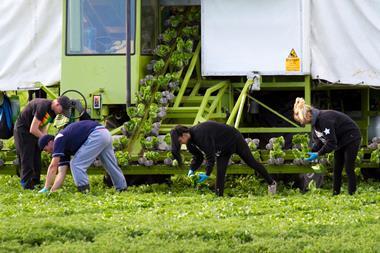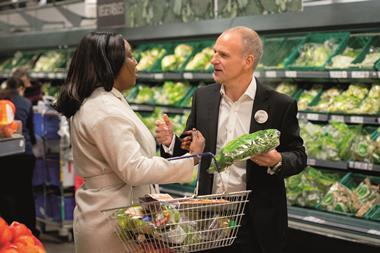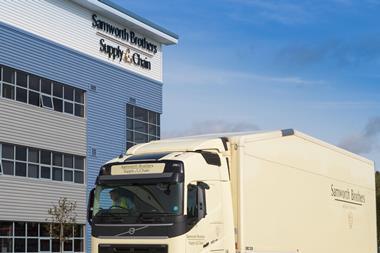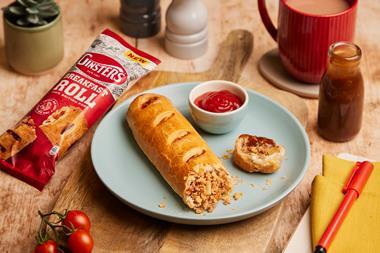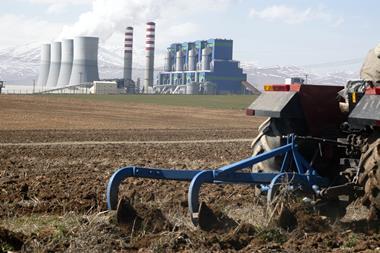Putting its ‘tough’ reputation firmly in the past, Tesco has developed a new, long-term partnership approach
Over the last five years, Tesco has transformed the way it works with suppliers. “We always had a reputation for being tough because we wanted to drive the best deal for our customers, but we were always seen as fair,” says UK CEO Jason Tarry, who joined Tesco in 1990, and the commercial team in 1993. “But in the back end of 2013 we focused on some of the financial challenges, and ended up taking it too far.”
Since Dave Lewis took over in 2014, however, he has made decisive moves to redress the balance, replacing the lopsided retailer-supplier relationship with a more symbiotic one.
“The elements were long-term partnership, building capability together, and expanding value so you can share it,” says Lewis. “Which is very different from buy and sell, arguing over the value that exists today, short-term thinking and annual negotiations.
“It says, actually, I want long-term partnerships. I want to identify the best suppliers in the marketplace and I want to work with them. And I want to give suppliers some certainty so they have the confidence to invest in their business to innovate with us. So we’ve entered into a whole series of long-term supply arrangements we never had before.”
Of the 2,500 suppliers it works with in the UK, around 100 are strategic partners, all operating on the Tesco brand. These supplier relationships are typically three to five years, but can be as much as seven. It’s a win-win, says Andrew Yaxley chief product officer.
“If you invest in the manufacturing side, you normally invest in technology and efficiency, which means you can produce a better product for customers. That creates volume growth, and that volume growth goes back to the supplier. It becomes a virtuous circle.”
As an example, he highlights how Tesco has “consolidated our potato business to Branston, which has created volume for them. We take our grade, but we also supply Booker, and on top of that we have become an ingredient supplier, supplying to our suppliers who deliver prepared ready meals, the potatoes for topping fish pie, cottage pie and shepherd’s pie.”
“I want to identify the best suppliers in the marketplace and I want to work with them” - Dave Lewis, CEO, Tesco
For Branston, the move has reduced complexity. “You get a multiple grade coming out of the farms. Something like 63% of the cost is all farming and picking the crop, but we can utilise the full crop. The utilisation is really key. And that’s how you create efficiency. What it’s delivered is a long-term contract that has allowed them to invest in automation, and then factory equipment, which creates efficiencies and scale. They’ve seen substantial volume increases on their core business as a result.”
James Truscott, MD of Branston, which has been working with Tesco for over 25 years, can vouch for that. “The agreement has enabled us to invest an additional £20m in the most innovative technology”. And the way Branston innovates around new products has also changed. “Our new product development sessions have recently included a wide range of disciplines from across Tesco, but also actual Tesco customers. So we get immediate and candid customer feedback on new ideas from the people that matter most.”
AMT, which supplies 20 million boxes of citrus fruit, grapes, pineapples and melons to Tesco and will turn over about £250m this year, is another to have benefited. Part of the AMC Fresh group, it was formed in 2014 as part of a new supplier agreement with Tesco to solely focus on Tesco, mainly supplying the UK, but also stores in Europe and Asia.
Before the new agreement was put in place in 2014, the relationship could be “transactional”, “distant”, and was “much more complex,” says AMT commercial director Jon Hedge. With multiple suppliers “each with their own supply chains, there wasn’t the ability to leverage the scale in the most efficient way.”
That changed with the direct dealings it’s put in place. “It has enabled us to leverage Tesco’s scale and remove a significant amount of cost for them to reinvest in price but there have been multiple benefits,” he adds.
“What has happened is that Tesco has got much closer to the grower, and the growers feel part of Tesco and what Tesco are doing, which has resulted in Tesco getting a better quality of product, which benefits customers. It’s also driving new varieties, by us being able to eliminate some of the historically weaker varieties of fruit and replace them with upgraded varieties that provide customers with a better quality product, better shelf life, higher yield for the growers plus reduced costs. It also gives us confidence to invest in more farming.”
Any cynicism about Tesco’s motives belongs in the past, adds Hedge. “Considering the size of their business and the number of employees, their ability to build that way of working and culture is impressive. And I think it is heartfelt and very genuine. When I talk to people about supplying Tesco, often people’s view is it must be difficult. That perception is extremely ill judged.
“Working with Tesco is challenging, you expect that, but the things they are trying to do, the quality they deliver, what they do in their farming practices, what they do with sustainability, many of those things are not always understood by people. Sometimes Tesco doesn’t shout enough about some of the things they’re really good at.”
Internally, Tesco has also changed the way it sets targets for buyers, which Lewis says also benefits suppliers. “It’s a simple thing,” says Lewis. “I don’t target people on percentage margin any more. For the old model, the buying team would be targeted on the percentage margin of what they bought. Now, I measure them on the cash profit of what we sell, and therefore they can work with a supplier and say, actually, given the weather conditions, or the commodity prices, are we better off being sharper on price and driving volume? Last year the big one was strawberries. There was 20% more crop than usual, and it came two weeks early.”
Historically, the farmer would “either flood the market or would plough them back into the ground, because they don’t want the cost of picking them if they then can’t sell them. But because of the long-term partnerships we now have, they tell us what they’ve got. We agree that, OK, we were going to buy 100, but now we will buy 120. That additional 20 comes at a cheaper price than the 100, so our average price for the 120 is slightly lower, but the farmer has revenue for every single bit of his crop, the customer gets a better price, and we sell an awful lot of strawberries. That’s how we’ve been trying to work in partnership.”
In addition to long-term contract, Tesco has a direct relationship with around 3,000 of the 38,000 farmers it works with, through its Tesco Sustainable Farming Group. The first launched in dairy in 2007 and there are now 10, each looking to achieve that combination of efficiency, transparency and fairness.
But whether it’s farmers or manufacturers the key to the dynamic, says Lewis, “is to be open, to be transparent – we are the only retailer that publishes trading terms. We don’t negotiate trading terms, they are all out there, we pay all small suppliers within 14 days.
As an example of how much things have changed in terms of power plays, Lewis cites last year’s changed to Tesco’s general ledger system. “It was two months later than we thought. It came in November of last year – so just before Christmas, a difficult time for us. We were concerned that if there was a problem with the general ledger some of our suppliers wouldn’t get paid on time. So we had two choices – either say ‘we’re changing the system so the payment will be late, sorry’, or you pay them early, so they have their money and we go through the system change ourselves and recover it afterwards. We chose to pay them early. It was our problem, our change, why should our suppliers suffer the cash flow changes from doing that? So I went to the market and said ‘this is why the cash flow in the fourth quarter isn’t the right way, but it was the right thing to do’. And I think that’s why people talk about a transformational change, because it truly feels more like a partnership again.”
With a strategic focus to build meaningful long-term partnerships with its preferred suppliers “it’s fantastic for Bakkavor,” says customer director for Tesco, Hannah Bendon. “They know our business and people well, understand and fully support our growth plans, and have given us the confidence to invest in the future for mutual gain. It now feels like we are running one business end to end with a single, clear agenda.”
And the relationship is “definitely getting stronger”, adds Bendon. “There’s a genuine sense of pride from the teams here about the work we do for Tesco and an absolute focus on providing great quality, value, insight, innovation and service.”
As well as working closely on reformulation, Bakkavor also helped to develop the new Tesco brand Wicked Kitchen. It is one of two key suppliers making Wicked Kitchen vegan products for Tesco. It’s now a £26m brand and has grown substantially since it launched, from 32 products to 80 today. “Bakkavor and Tesco have taken risks to bring plant-based product solutions to the consumer, unlocking true innovation,” says Bendon. “We believe that vegan and plant-based foods are here for the long-term and we are well positioned to keep providing Tesco with world leading product innovation.”
This innovative response to consumer trends ties in with Tesco’s overarching aim. “Focusing on the customer, the product becomes the heart of the opportunity, when in the past, it might not have been,” admits Yaxley.
The result has been a prolific outpouring. “In the last 20 months we’ve relaunched 15,600 products across three tiers. We don’t own manufacturing sites, we don’t own farms, we don’t grow anything. So you can only go on that journey if there is a real partnership. We’ve taken every single Tesco line, rebranded them, relaunched them, improved the quality, reduced salt, reduced fat, reduced sugar and still delivered for the customer. And you cannot do that unless you’re working with your suppliers in a better way.”
He points out Tesco’s development kitchen, where he holds all his supplier meetings now. “We probably have 80 supplier meetings a week in the kitchen, whether it’s for a Tesco brand or for branded products. How does it taste? What does it look like? What’s the packaging like, the cooking instructions? Getting back into that level of detail has made a big difference to quality. It’s working.”
Yaxley cites Tesco’s viewpoint system, which is used to measure supplier satisfaction, as evidence. “Back in 2015 we were scoring 55%, but we got our supplier viewpoint scores for the beginning of 2019 and it’s now at 81%. We think that is market leading.
“Of course I think you always have to do more, the journey is never finished, and I always ask suppliers how we can improve, but the step change I’ve seen in the business has been incredible.”
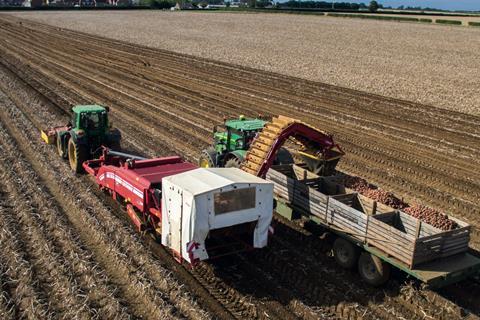
Branston
Branston has been supplying Tesco with potatoes for over 25 years. Since signing a long-term contract it’s invested an additional £20m.
Together with an open and transparent relationship it’s unlocked supply chain efficiencies, says MD James Truscott. “We have honest conversations about the smartest, most sustainable way to work. From using broader product specs within the Farm brand Tesco products, to using potatoes outside the fresh product specifications to make ready to cook products in our prepared factory, to investing in our ingredients factory, supplying over 400 tonnes per week of peeled potatoes to Samworth Brothers, one of Tesco’s prepared meal suppliers, we are utilising more of the crop, making the supply chain as efficient and sustainable as possible.”
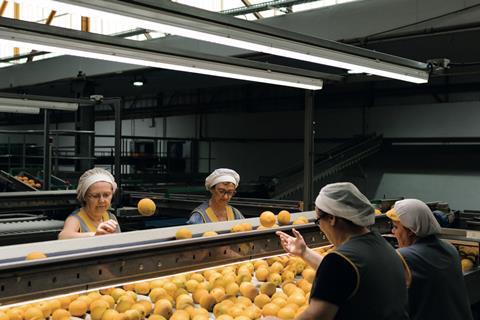
AMT
AMC Fresh group has worked with Tesco for over 20 years but in 2014 it formed AMT to solely focus on supplying citrus fruit, grapes, pineapples and melons to Tesco. With an initial five-year contract, “it gives us confidence to invest much more heavily into innovation, like packing lines with state-of-the-art machinery and automation which drives efficiency and reduces costs,” says commercial director Jon Hedge.
But there have been multiple benefits. “Tesco have got a better quality of product, which benefits customers. It’s also driving new varieties, by us being able to eliminate some of the historically weaker varieties and replace them with upgraded ones that provide customers with a better quality product, better shelf life, higher yield for the growers and reduced costs.
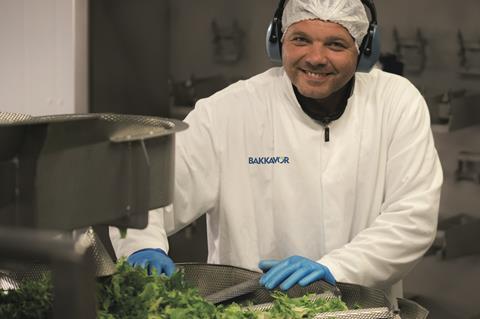
Bakkavor
Fresh prepared food specialist Bakkavor has worked with Tesco for over 50 years. “We’ve witnessed Tesco transform the way they work with suppliers and a step-change in our own relationship, says Hannah Bendon, Bakkavor’s customer director for Tesco. “Tesco knows our business and people well, they understand and support our growth plans, and have given us the confidence to invest in the future for mutual gain. It now feels like we are running one business end to end with a single, clear agenda.”
This has been recognised by Tesco through strategic supplier reviews resulting in significant new business gains.It’s also worked closely with Tesco to help its customers make “healthier food choices – reducing sugar, fat and salt, and adding fibre and extra vegetables.”
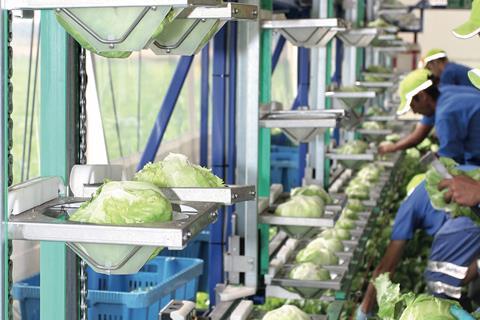
G’s
G’s Fresh has worked with Tesco since 1988, developing new technologies and techniques to improve quality, sustainability, innovation and value for UK customers, and supporting international growth. Sales with Tesco have enjoyed a meteoric rise as a result: from £800k in 1988 to £161m in 2018.
The partnership has spawned npd such as Tesco’s Fresh & Naked and Love Beets ranges, while a new direct haulage scheme is “a fantastic example of how the Tesco and G’s teams worked together to re-imagine the supply chain, to receive orders five days in advance,” says G’s chairman John Shropshire, “allowing us to operate a seamless supply chain from our dispatch in southern Spain, straight into Tesco depots, meaning products get on shelves quicker, reducing food waste and improving quality.”
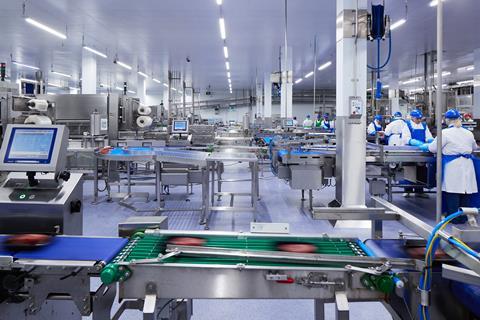
Hilton
The founding families of Hilton Foods has worked with Tesco for 50 years, but “the relationship has developed from a traded approach to one of total partnership,” says regional COO Frank McMyler. That’s enabled Hilton to expand into both Ireland and Central Europe as a fresh foods business.
“A transparent approach to business it allows us to focus solely on doing what’s right for consumers, which in turn has enabled us to expand into other product areas” such as convenience foods in Central Europe as well as fish, seafood and vegan products in the UK.
“A total partnership approach has supported investment in sites and processes which is paramount to ensure we continue to offer Tesco and its consumers excellent quality alongside the most efficient cost.”
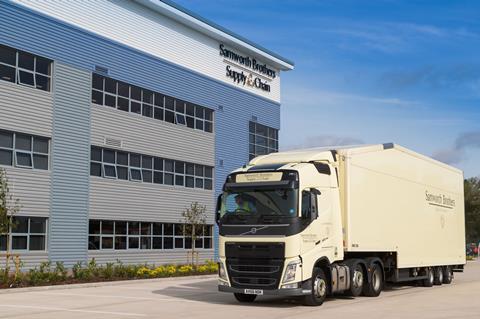
Samworth Brothers
Samworth Brothers has worked with Tesco since the 1980s but it turned into a strategic long-term relationship in the early 1990s, “when Tesco and Samworth Brothers observed the opportunities in the fast-growing sandwich market,” recalls director Mark Samworth. The resulting Bradgate Bakery greenfield site in Leicester continues to be a Tesco dedicated site 25 years later and Samworth Brothers is now Tesco’s biggest chilled food supplier.
A huge focus in recent times has been on health reformulation, and joint-funded research led to the creation of the vegan Wicked Kitchen range, while supply chain improvements have also yielded strong success in terms of efficiencies and waste reduction, backed up by support for Tesco’s Champions 12.3 UN sustainability pledge on food waste.
Food waste
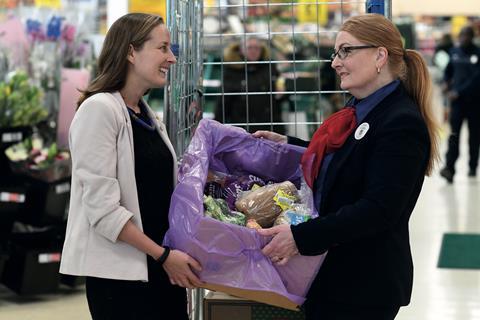
Tesco was the first business in the UK to publish food wastage figures (back in 2013). And at 0.45%, having now benchmarked it, “Tesco has the lowest food waste of any retailer I know,” says Dave Lewis. He’s not complacent though. “We all still felt, even though it’s a tiny percentage, it’s still a lot of food when you’re the size of Tesco”.
So Lewis has committed Tesco, as part of its Champions 12.3 UN sustainability pledge, to reduce good food that’s going to waste to zero. And Tesco is now “over 81%” towards that commitment says Yaxley. “What’s fantastic is that 27 of our supplier partners and 10 of our branded suppliers have signed up to halving food waste by 2030, measuring and publishing their data and taking action to tackle food waste from farm to fork. So as an industry, we’re creating some mass to say, look, this doesn’t make sense. No good food should go to waste.”
Tesco also has an “incredible partnership with Fareshare, where they take food from us on a daily basis, but as a product team we also focus on how we stop creating so much waste. A lot of that is in our supply chain, our ordering systems. We’ve launched products like Perfectly Imperfect, which means not everything is the perfect specification size that customers want, but it’s still great food. If we package it differently it creates a great opportunity to take the food that might go to waste in the supply chain through to the shelf”.
Tesco is also looking at “a lot more technology on the sorting lines, infrared scanners and sorters, which maximise the pack, the weight and the specification so you avoid having waste. Obviously, we’ve now got the outlet that we use with Booker, a lot of the packs they use are for catering and food service, and therefore it’s an ingredient. Put it all together and it flows through by reducing waste at source.”
“We know our customers want to reduce waste and save money and our suppliers are joining us. So it’s not just Tesco. It’s all of us together.”
Lewis urges other supermarkets to follow Tesco’s lead. Although they too are making efforts to reduce food waste, what they are “not doing is publishing their food waste data. And we would like them to. As chairman of Champions 12.3, the whole idea is measure and publish, because if you measure and publish we can share best practice as to where you can make an improvement. So this is not a source of competitive advantage for me, it’s just the right way to run our business.”
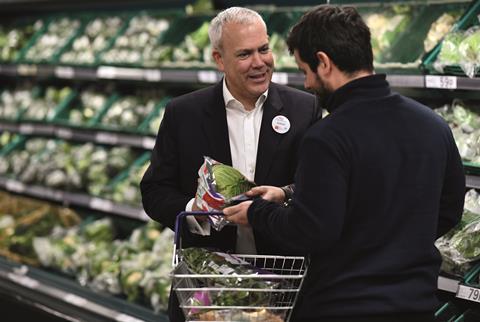
Incubator Scheme
“We set up the programme about four years ago, after we got a lot of feedback from small entrepreneurial start-ups saying ‘it’s really difficult to get on the shelves’,” says Yaxley. “Some of the big successes we have had in the past include Brewdog, Fevertree and Graze. We take about 10 really small start-up suppliers and say ‘this will give you an opportunity within Tesco, but more importantly we will take you through a whole programme of understanding how the buying teams work, what a technical order is about, what the ethical audit is about’. We cover every point where we think a small supplier might struggle to break through and help them understand how a bigger business operates.”
“We pay small suppliers within 14 days.” - Dave Lewis, CEO, Tesco
He says what’s “great about these suppliers is they have amazing products. So the product tastes amazing. Where they need support is how do they scale it? And how do they turn it into a business? We work with them for a 12-month period and at the end of that, obviously, we’re really hopeful that customers love the brand and then the proposition stays and becomes part of the annual cycle. Everyone who’s been on it has said it’s been really helpful, not necessarily in making their product better, because they’ve always had great products, but in the sense of how you get your product into a retailer and onto the shelf, so then you get your offer to customers.”
This year, Edinburgh-based food producer Mara Seaweed has made it into the scheme, with co-founder Fiona Houston describing it as a “game changer” for the business, and saying it would “allow us to learn from industry leaders and develop our brand and long-term partnership with the UK’s biggest retailer.”
Topics
Celebrating 100 years of Tesco
- 1
- 2
- 3
- 4
- 5
 Currently reading
Currently readingHow Tesco works with suppliers
- 6
- 7

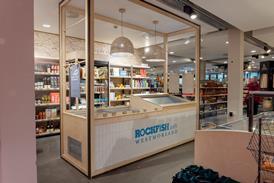
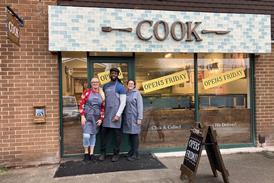
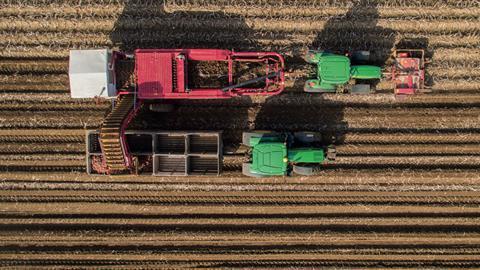


![1919 CMYK_CROYDON_MARKET[2]](https://dmrqkbkq8el9i.cloudfront.net/Pictures/100x67/5/3/1/167531_1919cmyk_croydon_market2_341116_crop.jpg)



